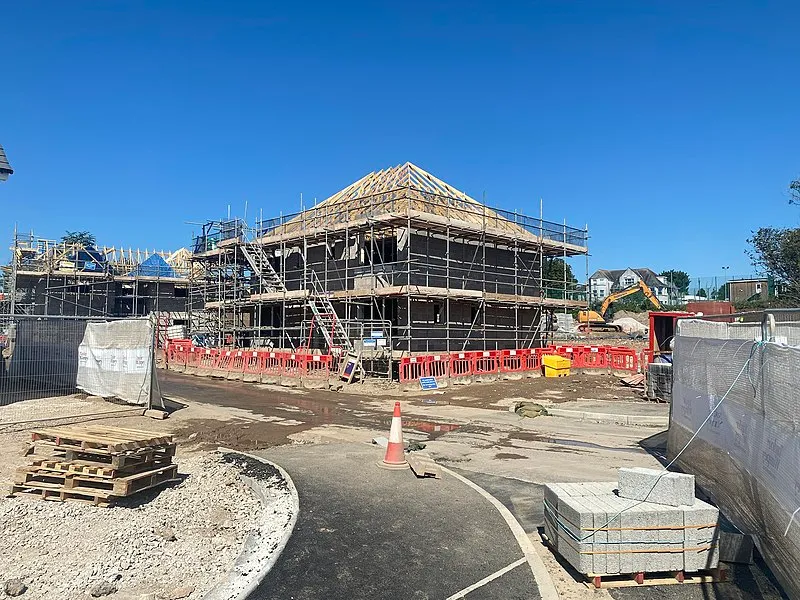Surprise! Building More Homes Won’t Solve Our Housing Crisis
Photo by Alan Hughes CC BY-SA 2.0
Originally appeared on Fran Quigley’s blog, Housing is A Human Right
Alex Schwartz and Kirk McClure are at the very top of any list of U.S. housing experts. Schwartz, a professor at the New School, literally wrote the book on U.S. housing, Housing Policy in the United States, now in its fourth edition from Routledge Press. McClure is professor emeritus in urban planning at the University of Kansas. Like Schwartz, he is a widely-published, highly-decorated expert on housing markets.
So when they call out the conventional wisdom on housing as BS, we should be listening.
In an article published June 30th in Barron’s (which appears at first to be behind a paywall, but clicking through got me access) they lay out the widespread agreement that the cause of our housing affordability crisis is a housing supply problem:
There is a growing, bipartisan consensus that the U.S. suffers from a housing shortage, and that this shortage is at the root of the nation’s housing-affordability crisis. This argument can be found in the popular press, academic literature, industry reports, state and local housing plans, and in White House statements. As the Biden administration put it in a May 2022 housing plan, “The best thing we can do to ease the burden of housing costs is to boost the supply of quality housing.”
How did such a powerful consensus come together? As the saying goes, follow the money. Government subsidies and tax breaks for housing construction makes real estate developers fabulously wealthy Banks, realtors, and corporate builders prosper from new construction, too. These industries’ fingerprints are all over the reams of reports and articles claiming that we need to build our way out of the housing crisis. As Politico reported in November, “Lobbyists are scrambling to get help from Washington to goose the housing market.”
But Schwartz’s and McClure’s paychecks don’t get a boost every time a crane goes up, so they decided to look past the hype and crunch the numbers. Those numbers show that 21st century housing construction has produced a surplus of 3.5 million units, including a surplus in virtually every metropolitan area. New York, for example, has a quarter-million more units than are needed to house its population.
Schwartz and McClure put it plainly: “Nationally, there is no shortage of housing, and adding to the surplus won’t resolve the nation’s affordability problems.”
That is especially true given that the vast majority of new housing construction is often luxury-priced or at least priced out of the range of those who struggle with housing insecurity. The idea that production of higher-end housing expands the supply in a way that allows other housing to become affordable is sometimes known as “filtering.” But among the problems with this theory is that it does not account for the millions of wealthy institutions and individuals keeping units vacant in lieu of renting them for lower prices--empty condos in cities are sometimes known as “safe deposit boxes in the sky.” In some U.S cities, there are more vacant units than there are homeless persons.
So, if a lack of supply is not the problem, what is causing our housing crisis? Nearly 600,000 people are homeless and 13 million households are currently behind on their rent or mortgage payments, thus putting them at risk of joining our clients who line up every week in eviction court. In this latest article, Schwartz and McClure repeat the straightforward explanation they have provided before, the same explanation reported annually by the National Low-Income Housing Coalition’s Out of Reach reports, and the explanation our clients tell us time after time: millions of people simply do not make enough money to consistently afford for-profit housing.
We have written here about remedies for that problem, including expanded and improved public housing and rent control. Schwartz and McClure renew in Barron’s their call for universal housing vouchers. That would be a fast, straightforward remedy for the shameful fact that 3 of every 4 eligible households are blocked from transformative housing subsidies simply because we don’t fund the program adequately. Increased wages and zoning reform will help, too, Schwartz and McClure say.
Again, Schwartz and McClure are unimpeachable sources on this topic, so I’ll quote them for the final convention-busting word:
The most effective housing assistance for low-income households is not found in building more units but in helping low-income households afford the units that already exist through housing vouchers for renter households and down-payment assistance for home buyers. The U.S. cannot build itself out of its housing crisis.

